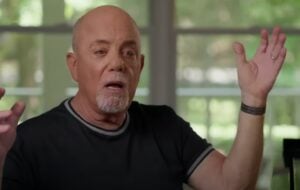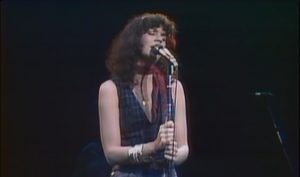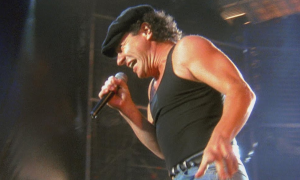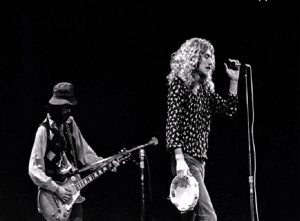How Famous Musicians Reacted To 9/11 Tragedy
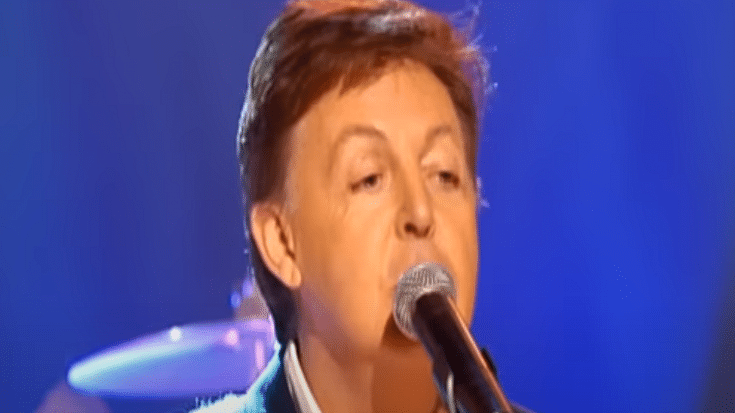
via PAUL McCARTNEY / Youtube
In the wake of the September 11, 2001, terrorist attacks, a profound shift occurred in the world. Lives were forever altered, and a palpable sense of vulnerability enveloped us. In just a matter of hours, the world underwent an irrevocable change.
Among those deeply impacted were rock musicians, who, like the rest of us, grappled with shock, grief, and a pressing need to make sense of the tragedy.
For musicians, turning to their craft in times of turmoil is second nature. As the world watched the horrifying events of 9/11 unfold, artists, too, felt the need to respond. Some were thousands of miles away, watching the news with the same disbelief as the rest of us.
Others, like Paul McCartney, witnessed the devastation from the vantage point of grounded airplanes at JFK airport.
The Beatle recalled the harrowing scene: “Out of the window on the right-hand side of the airplane, you could see the Twin Towers. First, there was a plume of smoke, and then there was a second. I thought, that’s an optical illusion. It’s probably just some sort of small fire. Eventually, the steward approached me and said, ‘Look, something serious has happened in New York, and we need to get you out of here.'”
Music became a unifying force
In the weeks following the attacks, music became a unifying force. Benefit concerts like The Concert for New York City and America: A Tribute to Heroes brought together a constellation of stars who lent their voices and talents to support the victims and their families.
Musicians from both sides of the Atlantic, including the Who, Mick Jagger, Eric Clapton, Bruce Springsteen, U2, and many more, stood shoulder to shoulder to offer solace through their music.
The impact of 9/11 on the music world endures to this day. Songs born from the tragedy continue to serve as poignant reminders of the resilience of the human spirit and the power of music to heal wounds.
More than twenty years later, we commemorate the horrible tragedy and salute these classic icons who let their music speak about the horrific accounts of that fateful morning.
Classic Rock Icons Reacted
PAUL MCCARTNEY HELPED ORGANIZE A LARGE-SCALE BENEFIT CONCERT AND WROTE “FREEDOM”
From his vantage point on the plane, Paul McCartney could see the Twin Towers of the World Trade Center, and he witnessed the plumes of smoke and the second plane hitting the towers.
After this harrowing experience, McCartney took action to respond to the tragedy. He played a significant role in organizing The Concert for New York City, which took place on October 20, 2001, at New York’s Madison Square Garden.
This event featured performances by McCartney himself, as well as other notable artists such as the Who, Mick Jagger and Keith Richards of the Rolling Stones, David Bowie, Elton John, and Eric Clapton. The concert aimed to raise funds for the victims and first responders of the 9/11 attacks.
He introduced a song called “Freedom” during the MSG performance, and it was subsequently recorded live for his November 2001 album, Driving Rain. McCartney explained the song’s theme, emphasizing its significance by stating, “It’s about freedom. That’s one thing these people don’t understand. That’s worth fighting for”.
BRUCE SPRINGSTEEN CAME OUT OF HIATUS TO DEDICATE A SONG TO THE VICTIMS; AND RELEASE AND 9/11-INSPIRED ALBUM
As the news of the attacks unfolded, Springsteen, who was at home in New Jersey, was immediately moved to respond. He channeled his emotions and reflections into his music, and looked back to a song he wrote a year ago “My City of Ruins”.
Penned as a song for his hometown in New Jersey took on a new, poignant meaning in the aftermath of the tragedy. Springsteen then participated in a televised benefit America: A Tribute to Heroes on September 21, 2001, just ten days after the attacks.
Opening the program, Springsteen performed “My City of Ruins” and introduced it as “a prayer for our fallen brothers and sisters.” This live rendition of the song became a powerful and emotional moment that resonated with viewers across the nation.
Following his A Tribute to Heroes performance broadcast, Bruce continued to reflect on the profound impact of the 9/11 tragedy. In 2002, he released his album The Rising, which was not only a direct response to the events but also, in Springsteen’s own words, a broader testament to enduring, universal themes such as grief, loss, and perseverance.
“My City of Ruins” became the closing track of The Rising, Springsteen’s first in seven years and first with the E Street Band in eighteen years.
STEVIE NICKS WROTE THREE SONGS ABOUT 9/11, ALTHOUGH ONLY ONE CAME OUT IN AN ALBUM
Stevie Nicks of Fleetwood Mac happened to be in New York City just before the attacks, scheduled to perform a series of shows. Her arrival in the city in the early hours before the tragedy meant that she, too, was a witness to the shocking events that would change the world forever.
In the aftermath of 9/11, Nicks was not content to merely be an observer. She felt a deep connection to the city and its people, describing herself as a part of New York City. She recognized the strength and resilience of the city and its inhabitants, acknowledging that they were living through a historic moment.
These heartfelt sentiments were captured in her journal at the time, where she wrote about the devastation she witnessed and the collective spirit of a city in mourning.
Nicks, being the artist she is, turned to her music as a means of coping with the overwhelming emotions of that period. She wrote several songs in the weeks following the attacks, including “Illume 9-11”, which later found its place on Fleetwood Mac’s 2003 album Say You Will.
The iconic songstress also penned two other tracks, “Get Back on the Plane” and “The Towers Touched the Sky”, although these songs were not recorded or released to the public.
NEIL YOUNG TOOK DIRECT INSPIRATION FROM DOOMED PLANE PASSENGERS AND WROTE THE SONG “LET’S ROLL”
Grunge and folk icon Neil Young was inspired by the incredible bravery and heroism displayed by the passengers of United Airlines Flight 93. So much so that he wrote a song about it, using one of the passenger’s final words as the title.
This flight had been hijacked by terrorists and was believed to be headed towards a target in Washington D.C. Todd Beamer, one of the passengers, made a courageous call to an Airfone operator, uttering the now-famous words, “Let’s roll”.
This phrase became a symbol of their unwavering determination and their collective effort to regain control of the aircraft. Despite the tragic outcome that resulted in no survivors, Young was deeply moved by their selfless actions.
To channel his emotions and pay tribute to the heroic passengers of Flight 93, Neil Young wrote a song titled “Let’s Roll”.
Young said of the heroes after releasing the song: “With no promise of martyrdom, no promise of any reward anywhere for this, other than just knowing that you did the right thing. And not even having a chance to think about it or plan it or do anything — just a gut reaction that was heroic and ultimately cost them all their lives. What more can you say?”
The famous iconoclastic rockstar also channeled his rebel spirit during the America: A Tribute to Heroes benefit concert. True to his nonconformist self, Young sang a moving cover of John Lennon’s ”Imagine”, a song infamously banned by Clear Channel (known today as iHeartMedia) among others for having “questionable” lyrics.
Interestingly, Young added a subtle change to the song’s lyrics: In place of the original “Imagine no possessions / I wonder if you can” in the third verse, Young shifts the focus inward and sings, “I wonder if I can”, transforming the iconic Lennon song from being slightly preachy into a more profound philosophical reflection.
EAGLES RELEASED A TOUCHING TRIBUTE, THEIR FIRST SINGLE SINCE 1994
Eagles’ initial plans for that day involved heading to the studio to work on their first album of new material in over two decades. However, when news of the devastating events reached them, the influential country rockstars made a collective decision to cancel their studio session.
It was a moment when the world stood still, and the band members felt that there was nothing worth pursuing that day.
In the midst of the shock and grief that enveloped the nation, Glenn Frey, one of the Eagles’ members, later revealed that it was during that very night that their creative response to the tragedy began to take shape.
Frey said in the liner notes to Eagles’ 2003 compilation The Very Best Of: “What’s the point? I don’t think there’s anything worth showing up for today. So we stayed home. And then that night Don [Henley] started “Hole in the World”.”
Don Henley, another founding member, completed “Hole in the World” with Frey, and it would ultimately become the Eagles’ first single release since 1994 (also their first recording since 1974 without guitarist Don Felder, whom they fired in 2001)
The song, which also showed up in the aforementioned The Very Best Of, was nominated for the Grammy Award for Best Pop Performance by a Duo or Group with Vocals in 2004. It lost to No Doubt’s reggae fusion hit “Underneath It All”.
DAVID BOWIE SANG “AMERICA” AND “HEROES” AT A BENEFIT CONCERT FOR 9/11 VICTIMS
Upon learning about the 9/11 attacks in 2001, David Bowie, who had become a resident of New York City, was away in Woodstock. The news of the attacks prompted him to immediately call his wife, Iman Abdulmajid, urging her to take their infant daughter to their apartment in downtown Manhattan.
The rock icon recalled his panic that morning when his wife told him on the phone about a second plane going down. Bowie urgently said,”’You are under attack, get the fuck out of there.”
Bowie’s deep connection to New York City was evident in his response to the tragedy. At an October 2001 benefit show The Concert for New York City, the Thin Duke performed powerful renditions of songs like Simon & Garfunkel’s “America” and his own iconic hit, “Heroes.”
During his performance, he took a moment to acknowledge and honor the real-life heroes of that day, including the firefighters from his local ladder in the FDNY. His words resonated with warmth and gratitude as he addressed the audience, expressing that it was a privilege to perform for fellow New Yorkers who had shown incredible bravery and resilience.
In the wake of the 9/11 attacks, Bowie’s actions and words demonstrated not only his personal connection to the city but also his empathy and respect for the first responders and the people of New York. His tribute and support were a reflection of his profound love for the city he called
PETER FRAMPTON OBTAINED AMERICAN CITIZENSHIP IN ORDER TO START VOTING IN THE U.S. ELECTIONS
Tickets to my November shows on the Never Say Never Tour go on sale today! I look forward to seeing you this Fall. Tickets are available at 10am local time. So, be on the lookout! 👀 🎸 pic.twitter.com/f5ydzARNWO
— Peter Frampton (@peterframpton) September 1, 2023
Acclaimed guitarist and songwriter Peter Frampton had a unique response to the tragedy that unfolded that day: he wanted to make his US citizenship legal, saying he wanted to begin voting in US elections.
Frampton was immensely saddened by the events that morning. He recalled: “I was in Cincinnati, Ohio, in exactly the same place, actually. I used to live in New York. I was in Westchester for 13 years. New York is like a second home to me. It’s very sad. I watched the programs about the building of the new World Trade Center and that was very optimistic to me. It was very hard to watch some of the other programs.”
British by birth, Frampton has been residing in various locations across the United States on a green card and dutifully paying U.S. taxes since around 1975. However, the events of 9/11 stirred something within him, prompting him to take a significant step towards making his connection with the country official.
“I’d been starting to talk for years that I must become an American citizen because I want to vote,” the guitarist recalled in 2011. The profound impact of 9/11 pushed him to take action.
Frampton woke up on the 12th and called his immigration lawyer with a mission in mind. He told the lawyer “It’s time. We’ve got to do this. Everything’s changed now. Nothing’s the same. I want to have my voice heard”.
Apart from the impact the attacks had on him, Frampton also felt the power of music as aa major factor in healing the fractured nation. “Music is very powerful… It could be without a lyric. It can be just a melody. A simple person playing on guitar or piano and something affects you. It’s also an escape. I think we needed to escape to come to terms with what had happened. I think music has always been a very healing entity,” the guitarist shared.
MICK JAGGER PERFORMED WITH KEITH RICHARDS IN THE CONCERT FOR NEW YORK CITY
Keith Richards, Mick Jagger, Pete Townshend, John Entwistle, Roger Daltrey and New York City firefighters posing backstage at the Concert For New York City 9/11 Benefit at Madison Square Garden on October 20, 2001 pic.twitter.com/BWYmyboW9U
— Jimbo Loko (@jimbo_loko) September 12, 2020
Mick Jagger expressed his solidarity with the people of New York as he performed in the Madison Square Garden benefit show The Concert for New York City with his Rolling Stones bandmate Keith Richards.
Jagger was part of a great ensemble of influential UK acts that included Paul McCartney (who organized the benefit), The Who, David Bowie, Elton John, and Eric Clapton. American counterparts included Bon Jovi, James Taylor, Billy Joel, John Mellencamp with Kid Rock, and many more artists from other genres of music.
A few days following his performance at the Madison Square Garden, Mick Jagger, who had a personal connection to the tragedy as his own daughter resided near the attack site, expressed his sentiments in an interview with Rolling Stone.
He said: “What I feel from a lot of my American friends, although they’re not really able to put it into words, is a sense of violation. It’s a horrible thing to have that feeling broken – that America was this place where they all felt safe.”
The influential frontman also encouraged the people not to lose hope and morale. “You have to mourn. You’re glued to CNN more than you should be. But in the end, you have to do what you do,” Jagger added.
L.A. GUNS ALSO HAD THEIR OWN SONG ABOUT THE BRAVE FLIGHT 93 PASSENGER
Guns N’ Roses predecessor L.A. Guns, much like Neil Young, also drew inspiration from the remarkable courage demonstrated by the passengers of Flight 93.
The L.A.-based glam metal rockers penned a song titled “Okay Let’s Roll”, in memory of Todd Beamer, who made a courageous call to an Airfone operator and uttered the now-famous words, “Let’s roll”.
Featured on the band’s 2002 album, Waking the Dead, the lyrics vividly describe the intense situation, with the skies over Pennsylvania turning into a battleground and the Twin Towers having already fallen two hundred miles away.
The song captures a poignant moment when one of the passengers calls his loved one to say goodbye, acknowledging the grim task at hand, and making it clear that he won’t be returning home. L.A. Guns wrote in the song:
“Skies of Pennsylvania became a battleground / Two hundred miles away, the towers had come down / One last chance to say goodbye, he called her on his phone / Said he knew what must be done, ‘I am not coming home’.”
INSPIRED BY THE HEARTBREAKING VOICEMAILS FROM THE 9/11 VICTIMS, MARK KNOPFLER AND EMMYLOU HARRIS WROTE THE SONG “IF THIS IS GOODBYE”
Dire Straits founder and primary singer-songwriter Mark Knopfler was one of the classic rock stars who got inspired by the events of the 9/11 attacks. Specifically, the influential guitarist was moved by the heartbreaking parting voicemails left by victims trapped in the towers and on the planes.
This inspiration solidified into the song “If This is Goodbye”, which has lyrics that end in a sorrowful “My famous last words could never tell the story / Spinning unheard in the dark of the sky, but I love you / And this is our glory if this is goodbye”.
The song became part of his 2006 collaborative album with American singer-songwriter Emmylou Harris, All the Roadrunning. The well-received collaboration was recorded sporadically over a seven-year period.
All the Roadrunning reached number eight on the UK charts and number 17 on the Billboard 200 in the United States. The title track, which had previously been released as a new track on the compilation album Private Investigations the year before, was also released as a single and reached number 8 in the UK.












